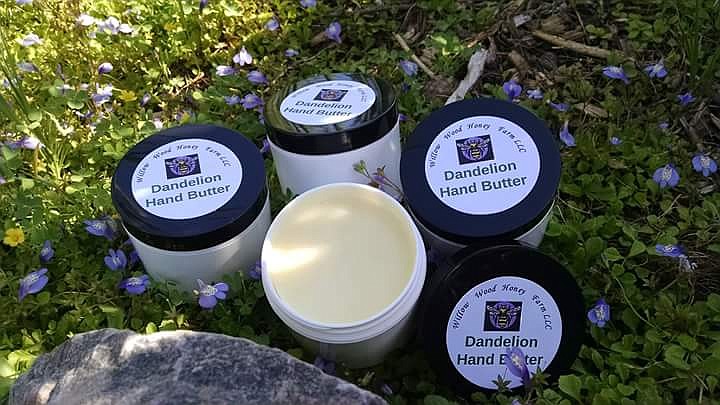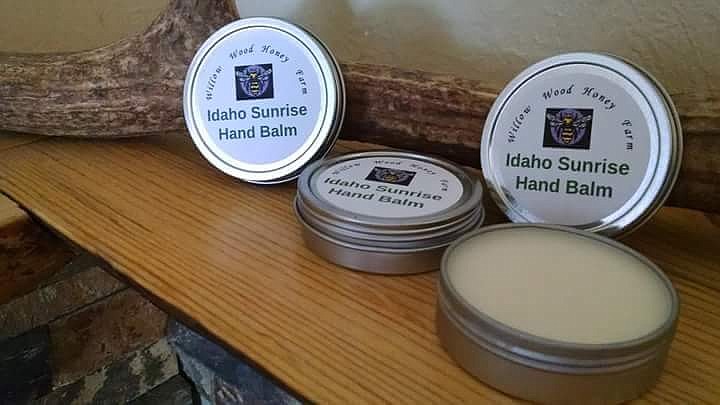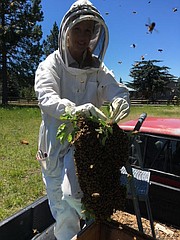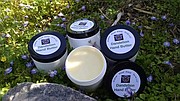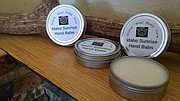Backyard Beekeepers
For most of us, the site of a bee elicits flailing arms and shrieks of contempt.
Such is not the case for Tracy O’Brien. Despite a nasty sting that landed the cheerful elementary school teacher in the emergency room earlier this summer, O’Brien loves bees. At least the kind that make honey.
An ardent beekeeper for the past decade, O’Brien, owner of Willow Wood Honey Farm, is passionate about tending to her hives in the backyards of her two properties in Hayden.
“I got into beekeeping about 10 years ago with one hive and within the summer I just fell in love with it,” O’Brien says. “I caught my first swarm and increased my hives to three and I found that not only did I love being with the bees, but that people were starting to come to me wanting to know more about honeybees.”
Today, O’Brien tends to 18 hives that are home to nearly 1 million bees (about 50,000 bees per hive during peak summer months). She plans to increase that number to 30 hives when she moves to property she recently purchased in the Athol area.
“I have a lot more demand than I have honey and unfortunately the field where my bees have been pollinating has become subdivisions,” she says. “Right now, I usually sell out within a week or two of every harvest of my honey.”
While the average hive can produce 10 to 15 gallons of honey per year, many of O’Brien’s hives produce less.
“I work on rescuing swarms, which means I don’t get much harvestable honey,” she says. “So you can see that this is a labor of love for me and not a big profit business.”
O’Brien does, however, cater to the desires of her honey-loving clients by setting up shop at the Kootenai County Farmers’ Market on Saturdays during the summer on Prairie Avenue of U.S. 95.
“I love being at the market and having students come wanting to talk bees—whether they’re past students in their 20s or 30s or my little third and fourth graders. It’s just fun,” says O’Brien, who teaches at Skyway Elementary and just started her 29th year as a local teacher.
She explains the difference between homegrown honey harvested from local hives and most honey found in grocery stores. “The jar you get at the store can say honey, but if you look at the ingredients, it actually is not,” she says. “It’s corn syrup and other things … industrialized honey is cheap. It’s clear it never crystalizes.”
The sweetness of successful beekeeping for O’Brien extends beyond producing her popular honey. She also harvests the wax and has discovered a market for that as well.
“A lot of people would just throw the wax away but I know how hard those little bees work for their wax so I learned how to use it to make hand cream,” she says.
Unlike many lotions and creams that contain alcohol and other chemicals, O’Brien’s Dandelion Hand Butter, Idaho Sunrise Sun Balm and Tea Tree Hand Butter contain all natural ingredients like coconut oil and olive oil.
“It’s all things that you can actually eat,” she says.
Several miles to the south, beekeeper Raini Cherry says she got hooked on the hobby about six years ago when a friend suggested they take a daylong beekeeping class in Spokane.
“After the class, she didn’t want to proceed, but I did!” says Cherry, who harvests about 15 gallons of honey a year from seven hives at her Cougar Gulch-area home.
Like O’Brien, Cherry touts the holistic healing properties of locally produced honey.
“It has a lot of health benefits and I love it for treating local allergies like hay fever,” Cherry says.
When a person eats local honey, she explains, they are ingesting local pollen collected from bees, which can fly up to 5 miles in search of food. Over time, a person may become less sensitive to this pollen. As a result, they may experience fewer seasonal allergy symptoms.
Cherry estimated her bees bring in seven or eight different types of pollen, offering a broad range of allergy protection. “The more I learn about these amazing little creatures the more fascinated I become,” she says.
While Cherry and O’Brien have been stung countless times, they say it’s an occupational hazard that is greatly outweighed by the benefits of beekeeping.
“It’s not really a big deal and they always say you’re not officially a real beekeeper until you get your first sting so it’s kind of a big moment,” O’Brien says.
Cherry agrees. “I have no idea how many times I’ve been stung, but I’ve gotten wiser with my protection. I don’t worry about it and, truthfully, it makes me sad cause when a bee stings me it dies.”
With her upcoming move to the Athol area, O’Brien says she’s excited about growing her beekeeping business.
“I love being a teacher and a beekeeper for so many different reasons,” she says. “One of them is I feel like I have a platform that I can educate people on the importance of honeybees. If you’re in the garden and there are honeybees, don’t be fearful—just sit and enjoy them and give them a chance to do their job.”
To learn more about O’Brien’s Willow Wood Honey Farm, visit facebook.com/willowwoodhoneyfarm/



